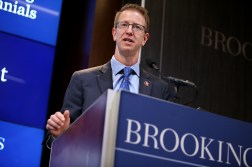Culture jeopardizes open data’s future beyond Obama — panelists

The problem with opening data is often a cultural one — not a technical one — a panel of open data experts said Monday at the AWS Public Sector Summit.
As the public sector prepares for a change in administration, experts are looking to codify Obama’s open data strategy in a way that survives the transition. Meanwhile, agencies are still fighting against an internal work culture that is averse to open data, panelists said.
“Often the roadblocks are really not technical,” said panelist Joel Gurin, president of the Center for Open Data Enterprise. He said cultural and legal concerns have dominated his recent roundtable discussions with agencies about open data.
Gurin said he recently hosted an interagency roundtable on privacy, for example, in which the main concerns officials voiced were not with the mission-related technology but rather the need for better data governance and a strategy to balance the public need-to-know with a potential identity breach.
Panelists said research data is one area that is still in need of a culture shift.
The problem is convincing researchers to release their data sets before publishing their research, said Debbie Brodt-Giles, digital assets supervisor for the National Renewable Energy Laboratory.
The NREL has been using AWS for seven years, and now they are incorporating data management plans into their annual operating plans, Brodt-Giles said.
“We kept going to our researchers and saying, ‘You really actually have to share this data. There are policies out there that say you need to,’” she said.
But researchers tell her: “Wait I don’t want to share my data yet because I want to publish on it.”
At another recent roundtable on research data, Gurin said participants discussed building incentives into the industry so researchers are equally proud of a citation for an open data set as they are publishing the finished research.
But before the culture shift, there is usually policy. Brodt-Giles said at NREL, policy changes necessitated shifting to AWS and opening its data.
Panelist Rebecca Williams, senior analyst at the Johns Hopkins University Center for Government Excellence, said tackling specific data sets, or specific aspects of data management, are going to be the next trends in policy.
“We have general open data now,” Williams said. “Now we realize we need all of these things to be consistent.”
But as the end of the Obama administration draws nearer, lawmakers are also looking to codify President Barack Obama’s 2013 executive order on open, machine-readable information with a bipartisan, bicameral bill.
“The government doesn’t look at data in a uniform way as an asset. We look at it as a liability and security risk,” said Aaron Wasserman, legislative director for Rep. Derek Kilmer, D-Wash.
Kilmer is the sponsor of the Open, Public, Electronic and Necessary Government Data Act, which aims to codify the Obama administration’s open data executive order.
Wasserman said to stay out of the news, agencies will closely guard their data and avoid sharing it.
“Unfortunately that is not really helpful; that is not what the government is for,” he said.
The Senate Homeland Security and Governmental Affairs Committee recently marked up an identical Senate version of the bill, Wasserman said, adding that Kilmer’s office hopes the House Oversight and Government Reform Committee will address the House version soon as well.
One of the bill’s important features: It requires all data assets to be publicly listed in an enterprise data inventory, Wasserman said. This was also a mandate of a 2013 Office of Management and Budget memorandum.
But Williams said there needs to be an oversight mechanism that can verify the whole inventory is being reported.
At the state and local levels, there is more success with the data inventory concept, Williams said.
“We’ve seen some local governments get a lot closer to that … full inventory,” she said.
After studying recent bills related to open data, Williams cautioned that their language is getting weaker, not stronger, and mentioned the “open by default” principle as one area where recent bills do not have accountability mechanisms.




